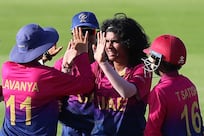Mahmoud Ahmadinejad claimed yesterday that an Iranian widow, languishing on death row since 2006 on an adultery conviction, was never sentenced to execution by stoning. The Iranian president's self-serving assertion, in an interview with Iran's official news agency, IRNA, suggested he is acutely sensitive to international pressure. He is in New York this week to address the UN General Assembly for the sixth time in his turbulent career.
Mr Ahmadinejad is also facing stern challenges at home from rival conservatives who accuse him of trying to monopolise power. Sakineh Mohammadi Ashtiani's stoning sentence has been officially documented in Tehran. It was recently suspended after a global outcry, but there are concerns that the 43-year-old mother of two could still be hanged on a separate charge of alleged complicity in her husband's murder, an accusation her children and lawyer deny.
Mr Ahmadinejad mustered a confident and pugnacious show at last year's UN General Assembly, just months after the Islamic republic was convulsed by his disputed re-election. The mercurial, populist and intensely ambitious Iranian president delights in his role as the world body's provocateur, always ready to denounce the United States. He knows he is toxic to US public opinion, but invariably plays to the Third World gallery.
Yet he may be less swaggering this year, even though a ferocious crackdown by the Iranian regime has quieted, but not silenced, the challenge from the so-called Green Movement of the opposition, analysts say. His influential hardline critics insist that sweeping sanctions over Iran's nuclear programme are a threat - despite his robust denials - and are resisting what they say are his attempts to redraw the republic's political map.
This increasingly bitter power struggle in Tehran has far-reaching ramifications, at home and abroad. The high-level rift among Iran's ruling elite could make it more difficult for Iran to speak with one voice on vital issues, such as its nuclear programme and any future overtures to end three decades of diplomatic estrangement with the US, analysts say. Despite his fiery anti-western rhetoric, Mr Ahmadinejad has shown evidence of wanting to forge an opening with Washington.
Theoretically, some of his more pragmatic conservative opponents may back that stance as being in the national interest. But, experts warned, internal politics could well take precedent, with Mr Ahmadinejad's rivals, such as Ali Larijani, the parliamentary speaker, and Hashemi Rafsanjani, a two-time former president, blocking engagement with Washington because it would bolster him. They "are so concerned about Ahmadinejad's self-aggrandisement and attempts to impose his political hegemony on the system that they are unwilling to buttress his diplomatic gambits ? even if they agree with its overall merit", Ray Takeyh, a senior fellow at the Council on Foreign Relations, a US think tank, wrote in yesterday's Washington Post.
The infighting was evident last week when Iran's judiciary - a bastion of conservative opposition to the president - initially blocked his attempt to free unconditionally a US woman held for 13 months on spying accusations. Mr Ahmadinejad apparently wanted Sarah Shourd, 32, released as a goodwill gesture to the US that would also ease pressure over Iran's human-rights record before he flew to New York.
Having flexed its muscles and humbled the president, Iran's judiciary agreed within 36 hours to free Ms Shourd - but on a hefty bail of US$500,000 (Dh1.8 million). She arrived home yesterday, leaving behind two male hiking friends - one of them her fiancé - in a Tehran prison. On the defensive yesterday, Mr Ahmadinejad attempted to pre-empt inevitable pressure in New York for their release as well. He insisted that it was now up to Washington to make a "humanitarian gesture" by freeing eight Iranians he said were "illegally arrested and detained" in the US or other countries at Washington's request.
Mr Ahmadinejad's opponents have voiced fears that he was undermining the system's democratic and theocratic pillars by investing far too much power in the Revolutionary Guard. Washington intervened in that heated internal debate yesterday when Hillary Clinton, the US secretary of state, urged the Iranian people to reject what she said was an expansion of the Iranian military's role and power. Her carefully chosen words indicated that Washington was not opposing Iran's Islamic system itself but its democratic failings.
"The early advocates of [the 1979 Islamic revolution] said this would be a republic. It would be an Islamic republic, but it would be a republic. Then we saw a very flawed election and we've seen the elected officials turn for the military to enforce their power," Mrs Clinton said in an interview with ABC television. "I can only hope that there will be some effort inside Iran, by responsible civic and religious leaders, to take hold of the apparatus of state."
Mir Hossein Mousavi, the leader of the Green Movement, has warned that Iranian society is becoming "more militarised". His concerns were echoed last week by Mehdi Karrubi, who also contested last year's "stolen" presidential election: he complained of the "unrestricted" interference of the Revolutionary Guards in politics and its untrammelled takeover of Iran's economy. Mr Ahmadinejad has garnered widespread media coverage on his previous visits to the UN. His first trip in 2005 provoked controversy at home when he claimed that a celestial green light had surrounded him as he addressed world leaders. In 2008, he stunned his audience by declaring: "In Iran, we don't have homosexuals like in your country."
mtheodoulou@thenational.ae




